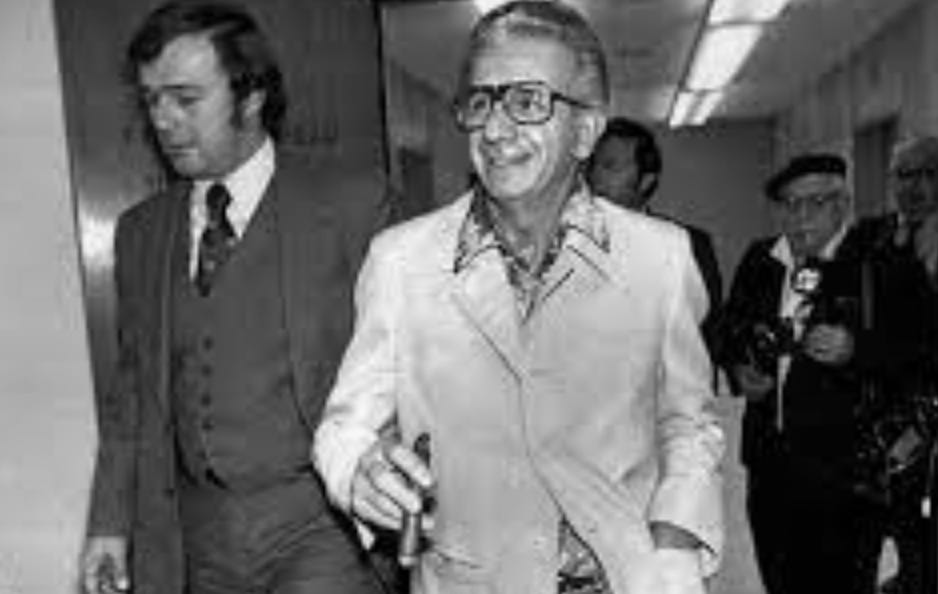
There was a time in my life, back when I was in my thirties when I was a crime reporter. Perhaps you are familiar with them from the movies: they are always two steps ahead of the cops, they put their lives at risk, and they are awakened at their crummy apartment at 6 a.m. by the lead detective, with whom they were in the army.
“Got anything to drink in this dump?”, the detective says.
Then the detective and the reporter toss back a scotch and the reporter does not worry one bit about not having any cheese or nuts in the house to go with it.
This was never me. It violated Wadler’s first and most important rule of journalism: Never put yourself in a situation in which people might shoot at you. I covered stories after the arrests had been made and the alleged perpetrators were behind bars.
I also did not take police detectives for drinks. I tried it once when I was reporting a transsexual love triangle murder for Rolling Stone and one drink in I told the detective everything.
I did, however, enjoy a story that gave the illusion of danger and that’s part of the reason I did the only mafia story of my life; an interview with Jimmy the Weasel, a former hitman for the Los Angeles mob.
Hop in the way back machine and bring cash, it’s the late ‘80s.
I am working at People Magazine, doing stories on movie stars with big hair and anyone who has come within a mile of Princess Diana and J.F.K. Jr., People Magazine’s Sexiest Man on Earth. (He wouldn’t talk to us, so I had to, let us say, finesse it: “Look at those thighs. Legend has it that if he lived in Tahiti, rather than Manhattan, he could crack coconuts with them.” Do not judge me. I had just bought a co-op and needed the money.)
People Magazine divides the universe into easy to swallow, bite-sized categories: “Couples”, “Critters”, “Coping”. “Split” or, possibly, “Splitsville” is another one; there was definitely a section on people with good bodies divorcing.
Jimmy the Weasel Fratianno, who is then 74 and has admitted to killing five people, is in the Witness Protection program. He has given an interview to one of the wire services complaining that the government has terminated his stipend, making it impossible to live decently. I find this hilarious. A mob hit man, struggling to make ends meet, who can no longer afford a decent Hugo Boss suit? This is what I call a Coping story.
It’s not difficult to set up the interview; Jimmy has written a book and his ghost-writer puts him in touch with me. Jimmy, who has a fabulous Central Casting gravely gangster voice, tells me to check into a hotel near the Seattle airport and that he will be in touch. He could just as easily have said he will be there at two in the afternoon, but as a book-shilling gangster, he understands theater and so do I.
I pack a tight black pencil skirt and Stuart Weitzman lizard pumps, because I know from the movies that gangsters appreciate a sharp dresser —
(Oh, excuse me, I have an IM from a reader:
Wadler, once again you betray your so-called feminism. You admit that in a professional meeting with a man, you planned to use your body, thus encouraging the objectification of women.
Reply: I’d say it was primarily my legs. although, at 39, it’s all primo, isn’t it?)
Do you care about Jimmy’s financial grievances? Neither did I. What interests me is that in one mob-ordered killing, Jimmy murdered a friend.
He had done this, Jimmy explains to me, because his friend was going against the bosses’ orders. Jimmy goes to his friend’s house in Los Angeles and tells him to change his ways and when the friend refuses, another gangster arrives and he and Jimmy strangle him. It’s not an easy death. Jimmy garrots the man; slipping a wire around his neck, then tightening it, slowly choking him to death. Then they take him north and bury him in a vineyard.
I am, by this time, at least a medium-boiled crime reporter. I’ve spent months at the murder trials of Jean Harris and Claus von Bülow (five bullets and two comas, respectively) but I still can’t get past this part.
“But Jimmy,” I say. “This guy was your friend, right?”
“Right,” Jimmy says, offering up nothing about, say, guilt, regret, self-recrimination, a confession to the priest from the old neighborhood.
“You’d, like, met his family, you’d been to his house for dinner?, ” I prompt,
“Yeah,” Jimmy says.
“You’d met the guy’s wife,” I say, exasperated. “So what did you feel when you saw her, like at the funeral.”
Jimmy cracks up.
“There wasn’t any funeral,” he says, laughing. “We buried him.”
I had taped the interview and when it is over I spend a lot of time replaying this part; listening for a pause, a quaver in Jimmy’s voice when he talks about murdering a friend, some sign of regret I have missed. Then I realize what I am doing. I am looking for a conscience in a man who doesn’t have one. I might as well have asked him about his tail. Jimmy the Weasel is a psychopath, he doesn’t have a conscience. I am an idiot.
I must say, though, the Weitzman pumps and pencil skirt are very effective. Soon after I am back in New York, Jimmy calls me up and invites me to meet him for a weekend in Las Vegas.
“Thank you, Jimmy,” I say. “But you’re a source, you’re married and you kill people.”
Then I call my mother in Florida to tell her about the proposition.
“It’s always nice to be asked,” Ma says.
And that is the last time I interview a gangster.
xxx
Subscribe to Joyce Wadler’s substack here.